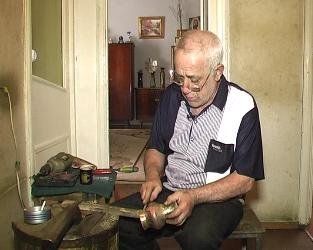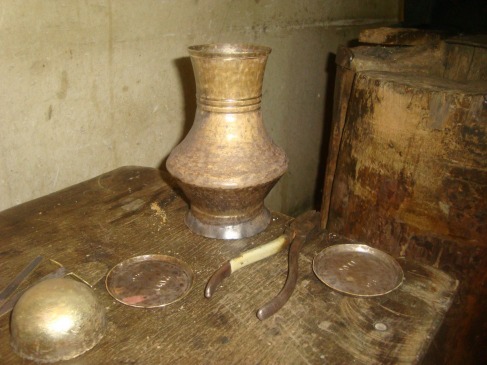
 By Margarita Hovhannisyan
By Margarita Hovhannisyan
Azad-Hye
Mushurba is a cup-like thing made of copper, with such a cavity inside that when you fill it with water, the air stays cool inside and when you drink it, it makes gurgles. This exotic sound trick has been implemented by master Edik's father, Souren Jamkochyan, many many years ago.
This unique cup has been one of Gyumri's [second city in Armenia] symbols. For several years now, Gyumri has been holding the “Golden Mushurba” event, where guilded mushurbas are granted to organizations and individuals who have stood out during the year with their achievements. On all of the mushurbas, master Edik's initials are inscribed: JES (Jamkochyan Edik son of Souren).
“I'm not as active as I used to be, I can't see well and I get tired too easily, but I cannot let go either, I don't want to”, says Gyumri's well-known and only mushurba maker, the 67 years old Edward Jamkochyan, while turning the item in his hands.
In order to see the mushurba or get one, many people from different countries have visited Souren Jamkochyan's father's workshop in the past. Now, the clients are mainly local Armenians and overseas visitors.
When the raw materials differ, the prices differ as well. Master Edik mainly receives orders for copper mushurbas, sometimes silver ones. The later is requested by wealthy collectors. His father used sometimes to receive also request for golden mushurbas. According to him, this is an expensive and infinite pleasure for the client and a double pleasure and responsibility for the maker.
“Copper is expensive in Armenia, and it's even more expensive in Gyumri. Sometimes people check through the internet what price the copper has-let's say- in England, so they could ask the same price here. This is already a dying profession; they should give me a break and leave margin for some profit”, he says.
“There used to be whole families in Gyumri that dealt with certain handicrafts. For example, the Nalbandyan family used to make horseshoes. The Damrchyan used to be blacksmiths, only our family, the Jamkochyans, went into two different directions, some became watch makers and some became coppersmiths. They migrated from Erzurum in Western Armenia in 1895-96 and got engaged in making mushurbas as type of the coppersmith profession. It should be mentioned here that the family name “Mushurbyan” has never been in use.
“If only there were someone who'd carry this profession on”, the master sighs looking at his handiwork, just like someone who would look at his loved ones before saying goodbye. Today, this profession is not being carried on by his youngest son Vahan (contrary to what many people think in Gyumri). Vahan only “helps out”?
The master's eldest son, Souren, has moved to Russia and has been living there for 17 years now, but the master, who is a patriot and a father first, hasn't come to terms with the idea of immigration yet. The family has been somehow scattered, his eldest child living far away.
“I can't help it; after he went away, I didn't even talk to him on the phone for two years? Last year, he came with his family and stayed for three weeks, but the days went so fast?”, the master said with a hardly audible voice and tears in his eyes.
Souren suggested that the master moves to Russia too; he begged, he tried to convince him, but in vain. The father has only agreed to go for a short vacation.
“I was overjoyed the moment I returned to my city, it's different in here? There, it seems as if you can smell the asphalt the whole time. Even if I go to Yerevan, I'd rather return back after three days”.
The sound of the little hammer was disturbing our conversation; I guess it was having its own conversation with its master. Although I didn't understand it, it sounded so pleasant and familiar to the mushurba maker.
Suddenly, Vahe, the master's three years old grandson approached us. The grandfather seated him on his knees and whispered in his ears.
“My child, when will I teach you the secret of this mushurba's gurgle?… At least you?”
Translated by Nanor Mikayelian
 TEXT IN ARMENIAN
TEXT IN ARMENIAN
Վարպետ Էդիկ Սուրենի Ժամկոչյան. Գյումրվա մուշուրբան
Մարգարիտա Հովհաննիսյան
Ազատ-Հայ
Մուշուրբա (կամ կլկլան) կոչվող պղնձից պատրաստված բաժակի ներսում այնպես է հարմարեցված, որ ջրով լցվելիս օդը մեջն է մնում ու խմելիս պղպջակներ են առաջանում` լսելի է դարձնելով կլկլոցի ձայն: Օրիգինալ այս բաժակն վաղուց է ինչ Գյումրիի խորհրդանիշերից մեկն է:
Արդեն մի քանի տարի շարունակ քաղաքում անցկացվում է ?Ոսկե մուշուրբա? մրցանակաբաշխություն, որի ժամանակ ոսկեջրած մուշուրբաներ են տրվում տարվա ընթացքում իրենց գործունեությամբ ակնառու կազմակերպություններին ու անհատներին: Իսկ բոլոր մուշուրբաների վրա դրոշմված է վարպետ Էդիկի ?լոգոտիպը?` ?ԺԷՍ? (Ժամկոչյան Էդիկ Սուրենի):
-Արդեն էլ առաջվանը չեմ. աչքերս լավ չեն տեսնի ու մե քիչմ էլ շուտ կը հոգնիմ, բայց չեմ կրնա ձերքիցս դնեմ էս գործս? Ու չեմ էլ ուզե,-պղնձյա կլկլանը ափի մեջ շուռումուռ տալով` ասում է Գյումրիի միակ մուշուրբիստ (մուշուրբայագործ) 67-ամյա Էդուարդ Ժամկոչյանը:
Մուշուրբան տեսնելու ու ձեռք բերելու համար ժամանակին աշխարհի տարբեր երկրներից են եկել Սուրեն Ժամկոչյանի` վարպետ Էդիկի հոր արհեստանոց: Իսկ հիմա մուշուրբայի պատվիրատուները հիմնականում ներսի հայերն են, ?մուշուրբայտեսք? նվերների հասցեատերերը` հիմնականում` արտասահմանյան հյուրերը:
Քանի որ պատրաստման հումքը տարբեր է, տարբեր են նաև կլկլանների գները: Վարպետ Էդիկի մոտ հիմնականում պղնձյա մուշուրբաներ են պատվիրում, երբեմն` նաեւ արծաթյա. վերջինի սեփականատեր են դառնում հիմնականում, ինչպես մուշուրբիստն է ասում, յուրահատուկ հավաքածուներին սիրահար մեծահարուստները: Ոսկե մուշուրբա իր մոտ չէ, բայց ժամանակին հոր մետ են պատվիրել. անսահման թանկ մի հաճույք պատվիրատուի համար, կրկնակի հպարտություն ու պատասխանատվություն` պատվերն իրագործողի համար: Օրինակ պղինձը Հայաստանում թանկ է, իսկ ավելի թանկ, վարպետի բացատրմամբ, դառնում է Գյումրիում:
-Կամպյուտրով մեկ էլ կնայեն, ըսնենք թե Անգլիա ինչ գին ունի էդ պղինձը, օր ստեղ էլ էդ գնով ծախեն. հեչ խիղճ չունին տնաշենները? առանց էն էլ մեռնող արհեստ է` իշտը թողեք քիչմ շնչենք,- գյումրեցուն հատուկ անկեղծությամբ մեկնաբանում է նա:
Գյումրիում ամեն արհեստ իրենով զբաղվող մի ողջ տոհմ է ունեցել: Օրինակ Նալբանդյանները նալեր խփող են եղել (նալբանդ), Դամրճյաններն ու Դեմիճյանները` դարբիններ (դամրճի): Միայն թե Ժամկոչյանների տոհմը երկու ճյուղի է բաժանվել` մի մասը ժամհարներ են եղել (ժամկեչներ), միյուս ճյուղն էլ պղնձագործներ, որ 1895-96թթ գաղթել են Արեւմտյան Հայաստանի Էրզրում քաղաքից ու որպես պղնձագործության տարատեսակ` հետագայում զբաղվել նաեւ մուշուրբայագործությամբ: Պետք է հատուկ ընդգծել, որ Մուշուրբյան ազգանուն չկա, բայց ով իմանա` գուցե սա էլ ապագայում առաջանար, միայն եթե այս արհեստը շարունակող լիներ.
-Միայն եթե այս արհեստը շարունակող լիներ?,- հոգոց է հանում վարպետը` գորովալից ու թախծոտ հայացք ձգելով մի քանի արդեն պատրաստի մուշուրբաների, ինչպես հարաժեշտից առաջ հարազատներին են հայացք ուղղում: Գյումրվա միակ մուշուրբիստի գործն այսօր ոչ թե շարունակում է որդիներից կրտսերը` Վահանը, (ինչպես շատերն էին կարծում Գյումրիում) այլ պարզապես ?օգնում է??
Վարպետի ավագ որդին` Սուրենը, արդեն 17 տարի է ինչ տեղափողվել ու բնակվում է Ռուսատանում, սակայն նահապետական գաղափարներով տոգորված գյումրեցին, կարոտած հայրը, մինչեւ հիմա չի կարողացել հաշտվել իրականությանը. ընտանիքը ինչ-որ իմաստով աղճատված է, իսկ ?մեծ ձագը? շա՜տ հեռու իր մոտից:
-Չեմ կրնա էլի, էրթալուց էրկու տարի հեռախոսին չեմ մոտիկցել? Անցած տարի մե 20 օրով էկան ընտանիքով, բայց էնքան շուտ թռան էդ օրերը?,- խոնավ աչքերով ու վերջին բառերն հազիվ լսելի ձայնով` ասում է նա:
Սուրենը վարպետ Էդիկին առաջարկել է տեղափոխվել Ռուսատան, խնդրել է, համոզել է, բայց` ապարդյուն. հայրը համաձայնել է ընդամենը մի քանի օրով հյուրընկալվել.
-Սիրտս ուռավ, հենց օր մեր քաղաք մտանք, մերն ուրիշ է?.Ընդեղ, տեսագըմ մենագ ասֆալտի հոտ գուկա,-պատմում է ռուսաստանյան օրերի մասին ու հավելում,- Էրեւան էլ իրեք օր մնալուց հետո չորրորդ օրը կպոկվիմ?
Փոքրիկ մուրճի թղկթղկոցը մերթընդմերթ խանգարում էր մեր զրույցը, բայց այն էլ իր զրույցն էր հյուսում վարպետի հետ` ինձ համր թեեւ անհասկանալի, բայց մուշուրբիստի ականջին խիստ հաճո ու հարազատ մի լեզվով?
Փափուկ, անուշիկ քայլերով մեզ մոտենում է երեքամյա Վահեն` թոռնիկը: Պապը նստեցնում է ծնկին ու շշնջում ականջին.
-Ձագուկ, քեզ ե՞րբ պիտի սովորեցնեմ այս մուշուրբայի կլկլոցի գաղտնիքը? Գոնե քեզ?
